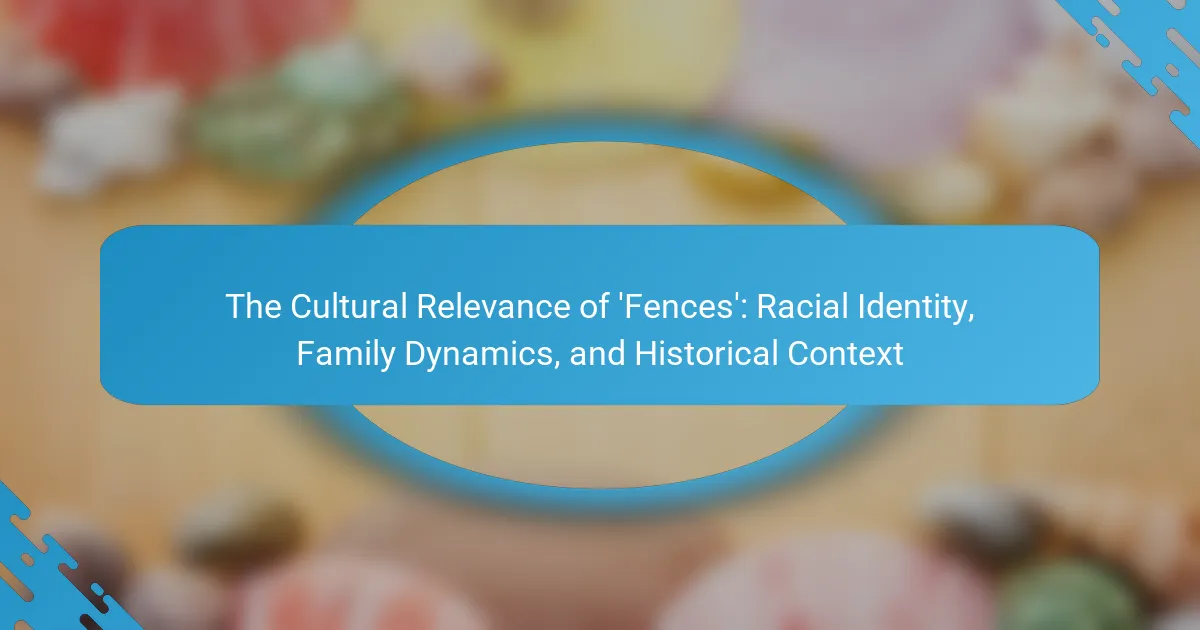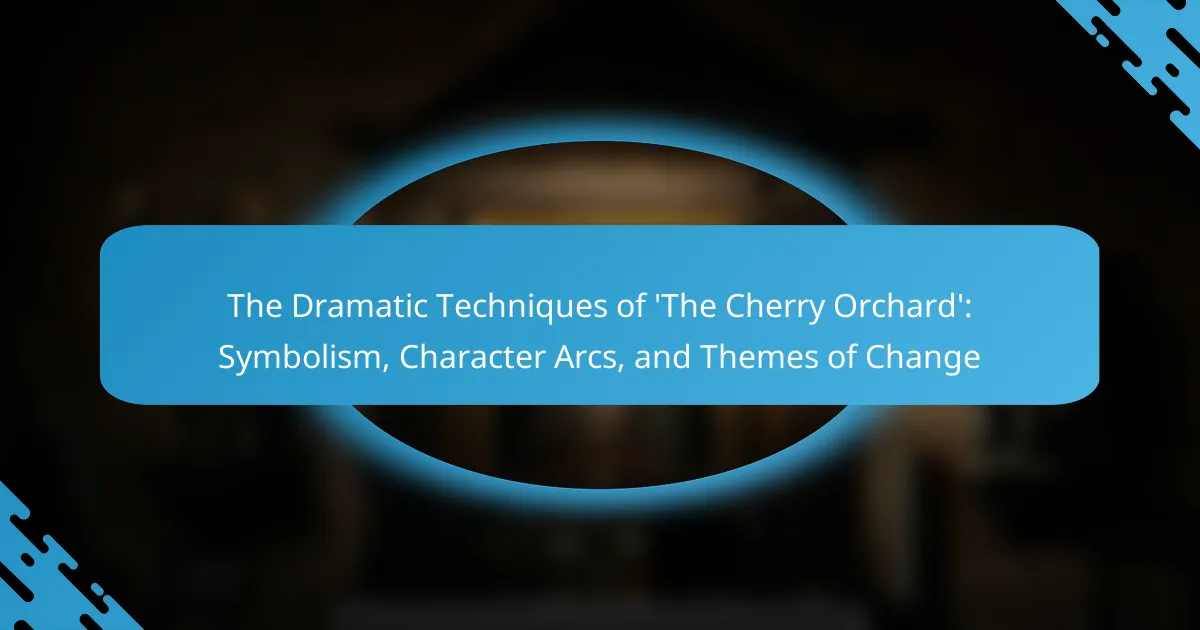“The Importance of Being Earnest” is a comedic play by Oscar Wilde, written in 1895, that critiques the norms and values of Victorian society, particularly focusing on marriage and identity. The play features characters leading double lives to navigate societal expectations, using witty dialogue and humorous situations to expose the absurdity of social conventions. Key themes include the contrast between earnestness and deception, as well as the superficiality prevalent in relationships. Characterization plays a crucial role, with characters like Jack, Algernon, Gwendolen, and Cecily reflecting and challenging societal norms, thus enhancing the play’s satire and social critique. The title itself underscores the importance of sincerity in personal relationships, prompting audiences to reconsider moral values and societal pressures.

What is ‘The Importance of Being Earnest’ and its Historical Context?
‘The Importance of Being Earnest’ is a comedic play written by Oscar Wilde in 1895. It satirizes the Victorian society’s norms and values, particularly regarding marriage and identity. The play features characters who lead double lives to escape societal expectations. It highlights the absurdity of social conventions through witty dialogue and humorous situations. Historically, it emerged during a period of strict moral codes and rigid class structures in England. Wilde’s work challenged these norms, reflecting the tension between personal desires and societal pressures. The play’s clever use of language and irony underscores its critique of superficiality in relationships. Its premiere was met with both acclaim and controversy, illustrating the cultural shifts of the late 19th century.
How did the socio-political climate influence the play’s themes?
The socio-political climate of Victorian England significantly influenced the themes of “The Importance of Being Earnest.” The era was marked by strict social norms and class distinctions. These societal expectations are reflected in the play’s exploration of identity and social status. Characters often navigate deception to conform to societal pressures. For instance, the use of fictitious identities highlights the absurdity of social conventions. Additionally, the play critiques the superficiality of the upper class. This critique aligns with the growing discontent among various social groups during the period. The themes of marriage and morality also mirror contemporary debates about gender roles and relationships. Overall, the socio-political context enriches the play’s satirical examination of society.
What historical events shaped the society depicted in the play?
The society depicted in “The Importance of Being Earnest” was shaped by the Victorian era’s social norms and values. The Industrial Revolution transformed the economy, shifting power dynamics and class structures. The rise of the middle class influenced social mobility and expectations. Additionally, the women’s suffrage movement began challenging traditional gender roles. The play reflects these tensions through its characters and themes. The emphasis on marriage and social status mirrors Victorian ideals. Furthermore, the influence of Darwinism questioned established beliefs, impacting societal views. These historical events created a backdrop for Oscar Wilde’s critique of societal norms.
How did Oscar Wilde’s personal experiences inform the narrative?
Oscar Wilde’s personal experiences significantly informed the narrative of “The Importance of Being Earnest.” His own struggles with identity and societal expectations are reflected in the play’s characters. Wilde faced societal pressures regarding his sexuality and social status. This influenced his portrayal of dual identities and the theme of deception. The character of Algernon embodies Wilde’s own wit and charm, masking deeper truths. Additionally, Wilde’s critique of Victorian norms is evident through the absurdity of social conventions depicted in the play. His experiences with love and friendship shaped the relationships between characters. Ultimately, Wilde’s life experiences serve as a backdrop for the satire and social critique present in the narrative.
What are the key themes explored in ‘The Importance of Being Earnest’?
The key themes explored in ‘The Importance of Being Earnest’ include the nature of identity and social conventions. The play satirizes Victorian society’s obsession with appearances and the triviality of social norms. It highlights the concept of ‘Bunburying,’ where characters create false identities to escape societal expectations. Another theme is the critique of marriage, portraying it as a social contract rather than a romantic union. The characters’ pursuit of love is often depicted as superficial and self-serving. Additionally, the play examines the conflict between sincerity and deception. These themes reflect Oscar Wilde’s commentary on the absurdities of his time.
How does satire manifest throughout the play?
Satire in “The Importance of Being Earnest” manifests through exaggerated character traits and social situations. Characters like Algernon and Jack embody the absurdity of Victorian social norms. Their trivial concerns highlight the superficiality of societal expectations. For example, the obsession with marriage and identity is portrayed as farcical. The play mocks the concept of “earnestness,” suggesting that sincerity is often a facade. Wilde uses witty dialogue to critique the hypocrisy of the upper class. Social pretensions are exposed through humorous misunderstandings and mistaken identities. This satirical approach encourages audiences to question societal values and norms.
What social critiques are presented in the characters’ dialogues?
The characters’ dialogues in “The Importance of Being Earnest” present critiques of Victorian society. They highlight the superficiality of social conventions. Characters often mock the importance placed on names and lineage. This critique is evident when Jack and Algernon discuss the triviality of their deceptions. The dialogue reveals the absurdity of societal expectations regarding marriage and identity. Additionally, characters express disdain for the hypocrisy of the upper class. Their witty exchanges underscore the emptiness of social status and wealth. Overall, the dialogues serve as a vehicle for Oscar Wilde’s commentary on societal norms.

How does Characterization contribute to the play’s impact?
Characterization significantly contributes to the impact of the play by shaping audience perceptions of the characters. Each character embodies specific traits that reflect societal norms and values. For instance, Jack and Algernon represent the superficiality of the upper class. Their witty dialogue and absurd situations highlight the hypocrisy of Victorian society. Additionally, characters like Gwendolen and Cecily challenge traditional gender roles. Their assertiveness and desires for independence resonate with contemporary audiences. The contrast between characters adds depth to the social critique. This layered characterization amplifies the play’s humor and satire, making its themes more poignant. Overall, effective characterization is essential for conveying the play’s message and engaging the audience.
What are the defining characteristics of the main characters?
The main characters in “The Importance of Being Earnest” exhibit distinct defining characteristics. Jack Worthing is responsible, yet he leads a double life, reflecting societal hypocrisy. Algernon Moncrieff is witty and carefree, embodying a more hedonistic approach to life. Gwendolen Fairfax is determined and assertive, showing a strong desire for social status. Cecily Cardew is innocent and romantic, representing youthful idealism. Lady Bracknell is authoritative and controlling, emphasizing the importance of social class. Each character’s traits serve to critique Victorian society’s values and norms. Their interactions highlight the absurdities of social conventions and the pursuit of identity.
How do the protagonists reflect the societal norms of their time?
The protagonists in “The Importance of Being Earnest” reflect the societal norms of Victorian England through their behaviors and values. They embody the era’s emphasis on social status, marriage, and propriety. For instance, characters like Algernon and Jack prioritize their social image and adhere to strict codes of conduct. Their use of deception, such as creating fictitious personas, highlights the hypocrisy of societal expectations. This mirrors the Victorian tendency to maintain appearances while often engaging in morally questionable behavior. The characters’ obsession with marriage further illustrates societal pressures, as they view it as a means of achieving social validation. Their dialogues often satirize the superficiality of social interactions, emphasizing the conflict between individual desires and societal demands. Overall, the protagonists serve as a critique of the rigid norms that govern their lives, revealing the contradictions inherent in Victorian society.
What unique attributes make characters like Jack and Algernon memorable?
Jack and Algernon are memorable due to their dual identities and wit. Jack, also known as Ernest, embodies the conflict between societal expectations and personal desires. His secret life allows exploration of authenticity versus deception. Algernon, on the other hand, represents irreverence and challenges social norms through his carefree attitude. His invented friend, Bunbury, exemplifies escapism. Both characters exhibit sharp humor, making their dialogues engaging. Their unique attributes highlight the absurdity of Victorian society, enhancing the play’s satire. This combination of duality and humor makes them resonate with audiences.
How do secondary characters enhance the narrative?
Secondary characters enhance the narrative by providing depth and context to the main storyline. They often serve as foils to the protagonists, highlighting their traits and motivations. For instance, in “The Importance of Being Earnest,” characters like Gwendolen and Cecily reflect societal norms and expectations. Their interactions with the main characters reveal underlying themes of identity and deception. Additionally, secondary characters contribute to the humor and satire inherent in the play. They engage in witty banter that critiques Victorian society. This interplay enriches the overall narrative, making it more engaging and layered. Their unique perspectives also offer alternative viewpoints on the central conflicts. Thus, secondary characters are essential for a well-rounded narrative experience.
What roles do Gwendolen and Cecily play in the thematic development?
Gwendolen and Cecily serve as pivotal characters in the thematic development of “The Importance of Being Earnest.” They embody the themes of identity and the absurdity of social conventions. Gwendolen’s fixation on the name “Ernest” illustrates the superficial values of Victorian society. Her desire for a partner with a desirable name highlights the absurdity of romantic ideals based on social status. Cecily, on the other hand, represents youthful innocence and imagination. Her creation of a fictional engagement with “Ernest” showcases the theme of deception and the fluidity of identity. Together, they challenge societal norms and expose the triviality of social expectations. Their interactions reflect the play’s critique of the importance placed on names and appearances in relationships.
How do the supporting characters contribute to the satire?
Supporting characters enhance the satire by embodying exaggerated traits and societal norms. Characters like Lady Bracknell represent the absurdity of social status. Their interactions highlight the hypocrisy within Victorian society. For example, Gwendolen’s obsession with names satirizes superficiality. These characters create humorous situations that critique social conventions. Their dialogues often reveal contradictions in societal expectations. Overall, the supporting characters serve as vehicles for Wilde’s commentary on social absurdities.

What is the significance of the play’s title and its implications?
The title “The Importance of Being Earnest” signifies the value of sincerity and authenticity in personal relationships. It implies a critique of Victorian society’s superficiality and the hypocrisy surrounding social norms. The play contrasts earnestness with deception, showcasing characters who adopt false identities. These characters illustrate the absurdity of societal expectations. The title suggests that true worth lies in honesty rather than pretense. Ultimately, Wilde uses the title to challenge the audience’s perceptions of morality and social conventions. This thematic exploration is central to the play’s satire and social critique.
How does the concept of ‘earnestness’ relate to the characters’ actions?
The concept of ‘earnestness’ directly influences the characters’ actions in “The Importance of Being Earnest.” Characters often exhibit a lack of genuine earnestness, leading to comedic situations. For instance, Jack and Algernon create false identities to escape societal expectations. Their actions reveal a critique of Victorian values, emphasizing the absurdity of social conventions. Additionally, Gwendolen and Cecily’s obsession with the name ‘Ernest’ highlights superficiality in relationships. These actions collectively underscore the play’s satirical examination of earnestness as a societal ideal. Ultimately, the characters’ behaviors reflect the tension between appearance and reality in their pursuit of social acceptance.
What irony exists between the title and the characters’ behaviors?
The irony between the title “The Importance of Being Earnest” and the characters’ behaviors lies in the characters’ insincerity. While the title suggests a value placed on earnestness and honesty, the characters frequently engage in deception and frivolity. For example, Jack and Algernon create false identities to escape societal expectations. Their actions highlight a stark contrast to the notion of being earnest. The characters prioritize social status and romantic pursuits over genuine honesty. This contradiction serves as a critique of Victorian society’s superficial values. The humor arises from the disparity between the title’s earnestness and the characters’ duplicitous actions.
Why is ‘The Importance of Being Earnest’ still relevant today?
‘The Importance of Being Earnest’ remains relevant today due to its exploration of identity and societal norms. The play critiques the superficiality of social conventions. Its themes of deception and the pursuit of truth resonate in contemporary society. Many people still grapple with the conflict between societal expectations and personal authenticity. The humor in the play highlights the absurdity of rigid social structures. This absurdity is evident in modern social media dynamics. The characters’ struggles for genuine connection mirror current relational challenges. Overall, the play’s insights into human behavior continue to engage audiences.
How do contemporary audiences interpret the play’s satire?
Contemporary audiences interpret the play’s satire as a critique of social norms and hypocrisy. The satire highlights the absurdities of Victorian society. Audiences recognize the exaggerated characters as representations of societal flaws. For example, characters like Algernon and Jack embody superficiality and deceit. This resonates with modern viewers who see parallels in today’s social behaviors. Additionally, the witty dialogue serves to engage audiences while prompting reflection. The humor allows audiences to confront serious themes in a light-hearted manner. Overall, the play’s satire remains relevant, sparking discussions about authenticity and societal expectations.
What lessons can modern readers learn from Wilde’s social critiques?
Modern readers can learn the importance of questioning societal norms from Wilde’s social critiques. Wilde challenges the hypocrisy of Victorian society through satire. He exposes the superficiality of social conventions and the absurdity of rigid moral codes. This encourages readers to reflect on contemporary societal expectations. Wilde’s works highlight the value of authenticity and individual expression. They remind readers to consider the consequences of conformity. His critiques advocate for the importance of personal integrity over societal approval. By analyzing Wilde’s perspective, modern readers can develop a critical lens towards their own social contexts.
What are some practical insights from ‘The Importance of Being Earnest’?
‘The Importance of Being Earnest’ offers insights into the nature of identity and social expectations. The play critiques the importance placed on names and social status. Characters often adopt false identities to navigate societal pressures. This highlights the absurdity of Victorian norms regarding marriage and morality. The humor in the play underscores the contradictions in social behavior. Additionally, the work emphasizes the value of honesty and authenticity. Wilde’s characters reveal the consequences of deception in personal relationships. Overall, the play encourages reflection on the authenticity of one’s identity in society.
How can the play’s themes be applied to current societal issues?
The play’s themes can be applied to current societal issues by highlighting the absurdities of social conventions and identity. For instance, the theme of dual identities reflects the pressures of conforming to societal expectations. This parallels today’s discussions on authenticity versus societal roles. Additionally, the critique of marriage as a social contract resonates with contemporary debates on relationship norms. The emphasis on superficiality in social interactions critiques modern social media culture. These themes encourage reflection on how societal norms shape personal identity and relationships today.
What best practices can be drawn from the characterization in the play?
Best practices drawn from characterization in the play include creating distinct, memorable characters. Each character should embody specific traits that contribute to the overall theme. For example, Lady Bracknell represents societal norms and expectations. This clarity helps audiences understand the social critique presented. Additionally, characters should evolve or reveal deeper layers throughout the narrative. For instance, Jack’s identity crisis highlights personal growth. Consistent character motivations enhance believability and engagement. Characters should also serve as vehicles for satire, exposing societal flaws through their interactions. This method effectively critiques social conventions while entertaining the audience.
The main entity of the article is ‘The Importance of Being Earnest,’ a comedic play by Oscar Wilde that critiques Victorian society through satire and characterization. The article explores the historical context of the play, emphasizing how the socio-political climate influenced its themes of identity, marriage, and social conventions. It examines key characters and their traits, highlighting their roles in reflecting societal norms and absurdities. Additionally, the article discusses the relevance of the play today and the lessons modern readers can draw from Wilde’s social critiques, as well as best practices in characterization that enhance narrative impact.

